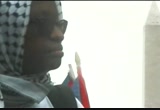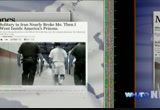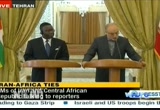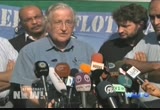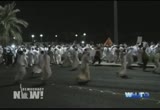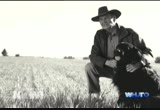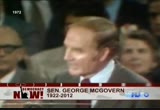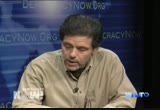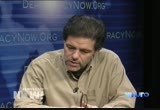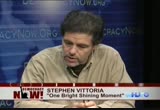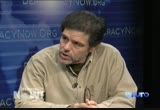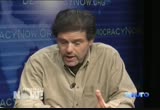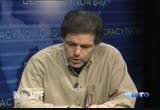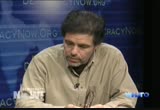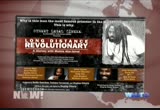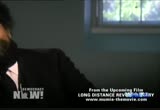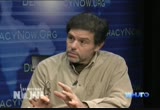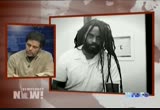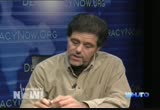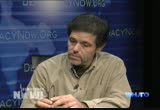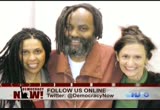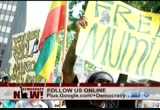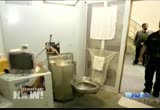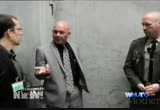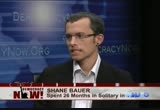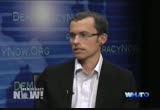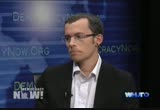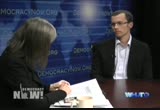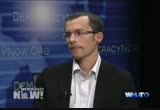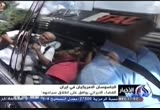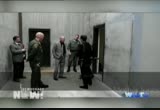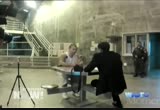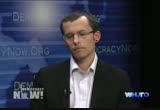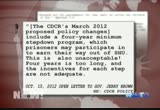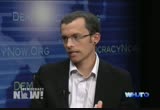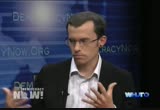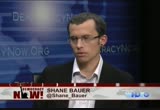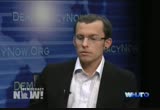tv Democracy Now WHUT October 22, 2012 6:00pm-7:00pm EDT
6:00 pm
10/22/12 10/22/12 [captioning made possible by democracy now!] >> from san rafael, california, this is "democracy now!" >> even if we stayed there and bombed for the next five years and americans continue to die and we spend another $100 billion, five years from now we will be right where we are now so let's recognize we made a mistake. these young men have given their lives and let's quit killing other young men. let's bring this war to an end. >> former presidential candidate and antiwar advocate senator george mcgovern dies of the age of 90. we will speak with stephen vittoria about his film, "one bright shining moment: the forgotten summer of george mcgovern."
6:01 pm
as well as his latest project, the new documentary, "long distance revolutionary: a journey with mumia abu-jamal." >> [indiscernible] >> and no way out. freed american hiker shane bauer rights, "solitary in iran nearly broke me. then i went inside america's prisons." >> i spent seven months in a prison cell. i thought this was one be better than it is. this is one of eight in a pod. a little over 11 by 7 feet, smaller than any i have ever inhabited. >> shane bauer was held in solitary confinement in iran for four months, now his written a
6:02 pm
major exposé on shocking conditions of solitary confinement inside the u.s.. all of that and more coming up. this is "democracy now!," democracynow.org, the war and peace report. i'm amy goodman. we're on the road in san rafael, broadcasting from the community media center. both the u.s. and iran are denying claims of having reached an agreement in principle for direct one-on-one nuclear talks. the new york times reported saturday a deal had been struck between u.s. diplomats and top iranian officials reporting to ayatollah ali khamenei. iran is said to have asked the talks be delayed until after the upcoming november elections so they could know with whom they'd be sitting down. but in a statement, the white house said --
6:03 pm
speaking to journalists, the iranian foreign minister also denied the report. like don't have anything these discussions or negotiations with america. yes, we had negotiations [indiscernible] 5 nations. if it is about nuclear talks, the talks are going on. except for that, we have no discussions with the united states >> the news comes as iran grapples with a plunging currency and growing international -- internal hardship in the face of crippling international sanctions. more broadly, iran has proposed the establishment of a nuclear- free middle east, but that call has gone all but ignored. a gunman killed three people and
6:04 pm
wounded four others at a wisconsin spa on sunday before taking his own life. the shooter, radcliffe haughton, had recently been put under a restraining order and called upon to surrender his guns over a domestic violence case. all three of the dead victims were female, including haughton's wife. president obama and republican challenger mitt romney square off in boca raton, florida tonight for a third and final debate focusing on foreign policy. on the campaign trail in virginia, obama debuted a new dig at romney, saying his opponent's alleged wavering on political stances can be explained as a case of "romnesia." >> he keeps forgetting what his own positions are, and he is betting you will, too. i mean, he is changing up so much, backtracking and sidestepping. we have got a name -- we have
6:05 pm
gotten in this condition is going through. i think it is called romnesia. [applause] that is what is called. >> tonight, "democracy now!" will continue our expanding the debate series. we're here in california, and we will be broadcasting the presidential debate after bob schieffer asks his question and mitt romney and president obama each respond, we will stop the tape and we will get responses from green party presidential candidate jill stein and justice party presidential candidate rocky anderson. then we will go back to bunker town for the next set of questions. that is expanding the debates series as we continue to break the sound barrier. unrest has broken out in lebanon following the assassination of a top intelligence official in a
6:06 pm
car bombing. the killing of a brigadier general prompted calls of syrian involvement, leading to protests at the end of his funeral on saturday. on sunday, militants traded fire in areas of southern beirut hours after mourners tried to storm government offices. the israeli navy has seized a ship of palestinian solidarity activists attempting to break u.s.-backed siege on the gaza strip. the estelle was the lead ship to attempt to reach gaza as part of the freedom flotilla coalition. on saturday, israeli navy vessels surrounded the ship and deployed forces on board to seize the passengers, taking them to prison inside israel. the passengers and crew were nationals from canada, israel, norway, sweden, and the united states. hours before the israeli raid, the ship organizer spoke to "democracy now!" from aboard the estelle. >> we're not breaking any laws.
6:07 pm
it is israel that clearly violates the public law. they are provoking the world. by doing so, by inviting the world to witness this crime against humanity, there also [indiscernible] presenting each and everyone of us with a choice but either be part of the problem are the part of the solution. >> a lawyer for the detained passengers has accused israel of using taser weapons during the raid on the ship, saying israeli forces committed "electro torture." israel has denied the claim. in related news, author professor noam chomsky made his first trip to the gaza strip over the weekend, appearing at an academic conference. during his visit, he said he was inspired at witnessing how
6:08 pm
palestinians survive under the israeli occupation and later expressed solidarity with the detained estelle passengers seeking to break the blockade. >> my main impression is how ,nspiring is to see under extres but nevertheless, remained vibrant, vigorous, active, hopeful, resilient and continuing to struggl. i should say every time israel stops a boat, that is another blow to its legitimacy and another element of support both to those who are resisting internally and to those who are opposing policies outside. sooner or later, the wave will sweep over the barriers. >> and other news from the occupied territories, palestinians held their first vote in six years over the weekend with a round of
6:09 pm
municipal elections. the vote took place only in the west bank as the governing how mass movement held a boycott in gaza following the breakdown of unity talks with the rival group fatah. police in kuwait cracked down sunday it on a crowd of thousands of protesters opposing the x monarchy's effort to change electoral laws. the u.s.-backed kuwaiti regime has stoked anger after dissolving parliament and proposing voting laws that opponents have described as a constitutional coup. on sunday, an estimated crowd of up to 50,000 gathered across the capital kuwait city in an attempt to march on government headquarters. at least 29 people were admitted to the hospital after police surrounded marchers and used tear gas and stun grenades to disperse them. deadly protests have broken out in panama over the sale of state-owned land within the duty-free area of cologne. on friday, and 9-year-old what was killed, several others wounded when police opened fire on demonstrators who burned
6:10 pm
tires and thrown projectiles. the shooting prompted further rallies over the weekend. a professor and protest organizer said the demonstrations would continue. >> we will continue this peaceful event. the front once the law to be repealed, not violence. >> the former south dakota senator and democratic presidential nominee george mcgovern has died at the age of 90. senator mcgovern is best known for running against richard nixon in the 1972 presidential election on a platform of withdrawing u.s. troops from vietnam. memorial services are scheduled to begin on thursday in sioux falls, south dakota. we will have more on george mcgovern's life and legacy after the headlines. a federal judge has blocked a new state law in arizona blocking funding for the reproductive services group planned parenthood.
6:11 pm
the law bans the use of public funds by state or local government to contract in the organization that provides abortions as one of its services. planned parenthood of arizona won a temporary injunction on friday, extended a freeze on the law's implementation. planned parenthood has faced a crackdown in more than a dozen states, including in texas, which last week for in a shut down a health program for low- income women rather than allow planned parenthood to remain involved. and those are some of the headlines. this is "democracy now!," democracynow.org, the war and peace report. i'm amy goodman. we are at the community media center in san rafael, california a. o'mara services are scheduled to begin on thursday in sioux falls, south dakota for former democratic senator and presidential candidate george mcgovern. he died on sunday at the age of 90. senator mcgovern is best known for running against richard nixon in the 1972 presidential
6:12 pm
election on a platform of withdrawing u.s. troops from vietnam, reducing defense spending, and providing amnesty to those who evaded the draft. on election day, mcgovern won only one state, massachusetts, and the district of columbia. within two years, nixon would become the first u.s. president to resign. mcgovern served in the senate from 1963 to 1981. on friday, we aired extended excerpts of the 2005 documentary, "one bright shining moment: the forgotten summer of george mcgovern." in a moment, we will be joined by the film's director stephen vittoria, but first to go back to george mcgovern's 1972 speech accepting the democratic presidential nomination. >> and this is also a time, not for death, but for life. in 1968, many americans thought
6:13 pm
they were voting to bring our sons home from vietnam in peace. and since then, 20,000 of our sons have come home in coffins. i have no secret plan for peace. of a public plan. as one whose heart has ached for the past 10 years over the agony of vietnam, i will halt the senseless bombing of indochina on inaugural day. [applause] there'll be no more asian children running tys from bombed out schools. there will be no more talk of bombing the cities of the north. within 90 days of my inauguration, every american soldier and every american
6:14 pm
prisoner will be out of the jungle in and out of their cells and back home in america where they belong. [applause] and then let us resolve that never again will we send the precious youngblood of this country to die trying to prop up military dictatorship abroad. [applause] >> the late george mcgovern at the 1972 democratic national convention. with us here in san rafael, california is stephen vittoria, director of the 2005 documentary, "one bright shining moment: the forgotten summer of george mcgovern." in addition to doing documentary, you came close to senator mcgovern. give us a thumbnail sketch of george mcgovern's like credit >> first, i want to thank you and "democracy now!" for embracing
6:15 pm
church mcgovern's life and legacy. for 40 or 50 years, the right wing in this country along with the so-called liberal court media has stomped all over his character. the man spent his life fighting for peace, fighting for justice, fighting to feed people. this is a great example of independent media, speaking truth to power. thank you. i became very close with george mcgovern. i did not want to make the film unless he was behind making the film. it would have been very difficult to do the film without him. we're going to talk about my mumia jamal film. but george was just an amazing politician in that he came from south dakota, a state that was incredibly conservative. in the 1950's, it was a one-
6:16 pm
party state -- republican. he and his wife eleanor, for years, crisscrossed the state together and literally brought back a democratic party and created two-party politics in south dakota. i know we want three and four party politics, but he had to get to-party politics first. he became a congressman in 1956. right from the very beginning, he was somebody that just the system constantly. he did so when john f. kennedy was president, with fidel castro, he thought america had a castro fixation. george mcgovern was also the earliest and probably the most trenchant voice against the vietnam war. the embargo he opposed to
6:17 pm
against cuba? >> i don't know critics talk @about the vietnam war. was he against a from the beginning? >> very much so. he did in fact vote for it of gulf of tonkin resolution. it was a vote that george, to his dying day, regretted making. there are only two senators that voted against that resolution. george told us in the film and told me on many occasions that he should never have believed what he was being told by both the kennedy and johnson winehouse. glocks which was? >> that this was going to be the kind of humanitarian effort. it was going to be quick. and that the gulf of tonkin was just to make sure the soldiers had what they needed. >> his speech is some of the most powerful against the war, saying another american boy should not die for foreign
6:18 pm
dictator. >> that is right. one of his most famous quotes was "and sit and tired of all the man dreaming up new words for young men to die." i think it is something that he held very tight his whole life. >> he spent a lot of time talking to senator mcgovern. what did you learn about him that may be others do not know? >> in world war ii, and george mcgovern was a decorated bomber pilot. he flew 35 missions over nazi occupied germany, when the average life span of a crew was about 17 or 18 bombing missions. very much like howard zinn, after the war, he had incredible nightmares and guilt about from the wild blue yonder what his bombs were doing to the people on the ground. george lived with that. conversely, that was one of the main reasons he had this anti- war stance throughout his entire
6:19 pm
career. he told me -- we were in a car on the way to breakfast on long island at the hamptons film festival. i felt like he wanted to share something with me. d me he honestly believedc.@ that he was a pacifist and that for an american politician, that is not the kind of thing that you want to roll out in front of the american public. at that time, george was 83, 84 or 85 years old. i said, and george, t what'she hell difference is it now? you're not running for anything. this would be a remarkable statement free to make. and to kind of go that extra few yards. but he wanted the whole lawn i think to the valor and glory of what he considered to be the good war. i know stilling the title from
6:20 pm
david swanson's book "war is alive," said george completely believed war is a lie. >> "one bright shining moment: the forgotten summer of george mcgovern." why do you say forgotten? what you think are the lessons that democratic candidates of the future took from george mcgovern since he won only one state plus the district of columbia? >> it truly felt to me like it was a forgotten summer of george mcgovern. i was a teenager at the time. i worked very hard on the campaign. i could not vote for him, but i worked for him. the socialhe 1960's, revolution of the 1960's, absolutely came to an end in 1972. the people that cut their teeth on the anti-war movement, civil- rights movement, the women's
6:21 pm
movement, they came together on george mcgovern's campaign. i will give you two examples. people that came out of those campaigns, you can see why it was a forgotten summer. on the negative side, you had bill clinton and hillary clinton who both worked tirelessly with george mcgovern. here we are all these years later, and it seems like bill and hillary clinton have written him off. learned anything from the george mcgovern campaign or the 1960's. michael moore, and the other hand, worked tirelessly for george mcgovern and we see what he did with that campaign and what he learned in that campaign. he took the ideas of finding more, fighting hatred, fighting poverty and has put it to work in his career, put it to work in his films. there were an awful lot of people who kind of sold out from the george mcgovern campaign, and it truly was a forgotten
6:22 pm
summer. a few people held on to it. >> i want to switch gears and ask you about your new documentary that you have just worked on, "long distance revolutionary: a journey with mumia abu-jamal." the film chronicles mumia's life as a journalist, writer, and public and intellectual even as he spent some 30 years on death row in pennsylvania. in 1982, abu-jamal was sentenced to die for killing philadelphia police officer daniel faulkner. he always maintained his innocence. last year, the third u.s. circuit court of appeals set aside his death sentence after finding jurors were given confusing instructions that encouraged them to choose death rather than a life sentence. in january, prosecutors announced it would no longer pursue the death penalty against abu-jamal, and the imprisoned journalist was transferred to the general prison population. in this clip from your film, we
6:23 pm
hear from some of the voices who supported mumia ball jamal over the years for it we hear from rubin carter, cornell west, mike africa, linn washington, james caan, ramona africa, and dick gregory. >> mumia abu jamal is one of the most souls of the revolution. >> mumia, how are you dealing with all of this darkness and despair and despondency and so for? he said it is a living hell, it is a nig. >> anybody who has the ability to draw a crowd with their voice and then speak truth was struck 08, my god. mumia abu jamal is a
6:24 pm
revolutionary person. he is like a guerrilla in the jungle in a tent in the rain, writing to the committee with next to nothing. >> here we have someone who says, yes, i'm not only a journalist, a revolutionary journalist and, no, i don't agree with anything you are doing and i have an international platform. interestingly enough, a platform and never used to talk about my own case. >> top governments like to control. they love to control. they love to silence. they cannot silence mumia. >> when you're pushing the line, the truth is very threatened. >> technology was there, it could move around the world. one day we would find out that was the voice of america. >> that is a clip from the new documentary, "long distance revolutionary: a journey with mumia abu-jamal."
6:25 pm
is written, produced and directed by stephen vittoria, coming to theaters in february. juan gonzalez and myself also speak in the film could juan gonzalez will be introducing the film in november in new york city at doc nyc. the significance of what we have just heard and why you chose mumia abu jamal as your next subject for a film? >> unlike any other film, book, video, article written about mumia, "long distance revolutionary" does not do with this case whatsoever. we mentioned it, but it is not the focus. the focus of the film is his life as a journalist, writer, historian, a revolutionary both prior to incarceration after incarceration. 30 years on death row and in
6:26 pm
general population for the last year or so. that is what really interested me about mumia. we know about the case. there is been plenty of pieces produced about the case. i did not want to mine that information again. the forces that have been keeping mumia board he is and put him where he is, they have had their narrative for 30 years. there is another narrative. the of the narrative is that this was an incredible young man at 14, 15 years old that was a writer for the black panther newspaper. he was a reporter and broadcaster for national public radio in his late 20s. he had an amazing career before december 9, 1981, when he was arrested and later convicted for the murder of daniel faulkner. it is just an incredible story that they have kept under wraps,
6:27 pm
and they want to keep it under wraps because he has transcended prison for the 30 years after. people like my partner on this film, no well has been able to get his voice out from death row, a dark hole on death row in pennsylvania, and delivered to the world. he has had an amazing impact on social and political discourse the world over. that is what the film is about. the voices you just heard, the outpouring of not only love, but intellectual respect and historical respect for mumia abu jamal is absolutely incredible. recapture it in this film. we talked a great deal about the ugly reality of mass incarceration in this country. michelle alexander is in the film, the author of "the new jim crow."
6:28 pm
she helps to frame how and why men and women like mumia are where they are. so the film, lawyers -- covers that art of mumia's life. pearl jam offered as a music, which is absolutely incredible. we have a stellar interview cast. we're looking for to sharing, quite frankly, is a brand new story with audiences all across the world. >> stephen vittoria, thank you for being with us, "long distance revolutionary: a journey with mumia abu-jamal." the film premieres at the mill valley film festival and coming to theaters in february. his 2005 documentary is called, "one bright shining moment: the forgotten summer of george mcgovern." this is "democracy now!," democracynow.org, the war and peace report. i'm amy goodman. when we come back, we will continue on the issue of
6:29 pm
6:31 pm
>> this is "democracy now!," democracynow.org, the war and peace report. i'm amy goodman. san rafael, california, on our 100-city tour of the community media center of marin. its first live, global broadcast. we turn now to a major new investigation by shane bauer, one of three americans detained in 2009 while h in iraq's kurdish region near the iranian border. he and joshua fattal were held for 26 months, and sarah shourd, now shane's wife, was held for 13 months, most of it in solitary confinement. seven months after being freed from prison in iran, shane bauer began investigating solitary confinement in the year ended states. now his first major article since his release, he finds california prisoners are being held for years in isolation
6:32 pm
based on allegations they're connected to prison gangs. evidence against them might include possession of "black literature" or writings about prisoners' rights. shane's report appears on the cover of the new issue of " mother jones" magazine. it is called, "solitary in iran nearly broke me. then i went inside america's prisons." this figure report that goes with the article documents shane bauer's journey to california's pelican bay prison, his first time behind bars since been released. >> i don't know what is going to be like, to be honest. i am curious what it is one to be like to step in. i have not been in a prison since i was released in iran. not just any prison, but to be
6:33 pm
walking in the pelican bay. my name is shane bauer. in 2009, i was captured on the iran-iraq border with josh fatal and sarah shourd. we never knew when or if we would get out. i spent four months in solitary confinement did i did not expect to find the same or worse back at home in california. >> solitary confinement was the worst experience in all of our lives. > >> just getting my cameras redding. i have this feeling of heaviness. i am nervous.
6:34 pm
to pelican to go in bay state prison. i know i'm going to see people who up in living in solitary for a very long time. >> always be on your toes through the >> my guides are the ticket chris acosta and the institutional bank investigator, david. pelican bay, one of the first supermax prisons in the country is infamous for its six shootinsecurity housing unit. some have never even broken housing rules. they're held indefinitely because the department of corrections says their connection, however continuously, to prison gangs. it is in seven months since i've been inside a prison cell. i thought this was going to be better than it is.
6:35 pm
this is one of eight in a pod. at a little over 11 by 7 feet, smaller than any i have ever inhabited. right now.shu cell the inmate is outside. another cell makes sleeps up there. it is pretty bleak. there is no natural light. cell,t a window in my i would not have heard the ravens. even in the winter, it would be suffocating. having that might come in, see the light move across the cell, i could gauge what time of day was. why don't they have a window? >> just the way it is designed. i don't know, i cannot explain it. >> a food trade will be passed through. >> prisoners have to strip
6:36 pm
naked, pass their hands through a food slot to have their hands cuffed, then wait for the door to open. >> inmates come out and get some exercise. there is more room to run. >> they only get one hour in this dog run every day. >> they are monitored with a video camera. >> in iran, the open air sell exercise was twice as big. iranian president is never far from my thoughts but i guys are the suckers about my position as i am about theirs. >> are you still with her? >> yes. [indiscernible] there is a camera. >> there is no contact? >> at pelican bay, decisions about who gets put in the shu goes down to one man. >> i am a man just like anyone but i don't see anyone else put in shu for unjust reasons. >> he essentially is the judge, jury, and prosecutor and a
6:37 pm
process called a gain dation. evidence against inmates could be something as simple as appearing in the same flow as a gang member. in my review of dozens of inmates files, officials frequently cite position of black literature, left-wing books, and writing about prison riots as evidence of gang membership. no actual judges involved in the information. the membershi >> that is an excerpt of the video report by shane bauer, a company his cover story for " mother jones" magazine called, "solitary in iran nearly broke me. then i went inside america's prisons." for more, we're joined now by shane bauer in his first live interview since his release. welcome to "democracy now!" lock up in iran again, he said, i saw a man put in the hole for the company they kept, the
6:38 pm
beliefs they held, did not expect the same in california. how was@fo to go into california's prisons after you, yourself, experienced what you did, including four months of solitary confinement in iran? >> it was difficult to go back inside, to visit a solitary cell, to step back in a cell that was built for solitary confinement. it was surprising for me to see the difference, how small it is in california, the fact they have no light, no windows in their cells. the small things that meant a lot to me in prison or absent. >> the right, the experiences are eerily like my dreams at a prisoner in another man's cell, like the cell i go back to in my sleep, this one is built for solitary confinement.
6:39 pm
i'm taking intermittent heating breaths like i cannot get enough air. to say t, this still happens me from time to time in tight spaces. how did you survive solitary confinement? >> the only way i think to get your solitary confinement is to kind of be diligent about maintaining your sanity -- exercising, reading when you can. it is not easy. there are times when all is not able to do that. and now being out, i spent four months in solitary confinement of my 26 months in prison in iran. now -- it sticks with the. it has been with me. it is something, as i described in the article, i still deal with psychologically and physically and that is normal for people who experience solitary confinement.
6:40 pm
in california, there are people who have been in solitary confinement for 10 years, 20 years. >> the right, the critical point is that many never know when they will get out. >> exactly. about 4000 people in california have indefinite sentences of solitary confinement. in pelican bay prison alone, 89 people have been in solitary confinement for 20 years. cox talked about some of the people in solitary confinement. how does someone get thrown in the hole here? >> by going to a process called validation, where they are validated as a member or associate of the prison gang. in order to do that, the prison officials have to cite evidence, a minimum of three pieces of evidence, to show their acts with a salt -- affiliated with the game. almost 80% of people who have
6:41 pm
indeterminate sentence may have spoken to someone who is involved in the game, appeared in the same picture, something as small as having their name written in the cell of the person who is a gang member. one case i do it in the article is deedrick pennington. he's been in solitary for four years based on three pieces of evidence, one of which is an article from the san francisco newspaper. it was an article complaining of or were a prisoner complaints of guards taking literature from a cell. another piece is 8 that he had with a dragon on it, which is considered a gang symbol by the department corrections for the third piece of evidence was the journal he kept in which he wrote about african-american
6:42 pm
history. he mentions nat turner, malcolm x, has statistics about the number of hangings in the mid- 20s century of african americans. in it he has a quote by george jackson which is used as evidence of gang affiliation. so he has been in for four years now and does not know when he will get out. >> you're right, the decision to put a man in solitary indefinitely is made and internal hearings the prisoners and last about 20 minutes, closed-door affairs. i was told i could not win this one, no one can pick any one of the sec, when josh fatal and i finally, for the revolutionary court in iran, we had a lawyer present but were not able to speak to him. in california, an inmate facing the worst punishment our penal system has to offer short of death cannot even have a lawyer in the room. >> right.
6:43 pm
a gang investigator, a staff member data as evidence against a prisoner. they basically take them in a room where they have the evidence presented. a lot of evidence is actual confidential, especially evidence that comes from prison informants. so it may be this procedure does not even not actually what the evidence is against him. like i said, he is not allowed have a lawyer. he can contested verbally, but that is the extent. >> what is the rationale that he cannot have a lawyer? >> i don't know. i ask the word in the same question at pelican bay and he said that they felt their internal review process was there's also no judge involved in the process. i would like to say in many of these cases like the case of dietrich pennington, these inmates have not even broken prison rules. they have not committed acts of violence in the prison.
6:44 pm
it is unrelated, really, to any kind of violent act. a prisoner who actually hurts someone can also be put in the shu for indeterminate amount of time, the longest of which is killing a guard, a prisoner of its five years in solitary confinement. but having these kinds of pieces of evidence like drawings or books or a letter written to someone is indefinite. >> gang affiliation can be longer in solitary than killing a guard. >> exactly. >> having a -- we were just talking about mumia abu jamal. he also referred to him in your piece. >> one of the cases that i@ looked into was that of ricky ray. in the evidence of his gang validation is mentioned as a
6:45 pm
material, writings by mumia abu jamal. >> that is king material. >> according to them. >> we're talking to shane bauer in his first live interview since he was released from an iranian prison. in that time that he was jailed for two years, four months was in solitary confinement. we will come back to this conversation in a moment. ♪ [music break]
6:46 pm
6:47 pm
our 100-city tour. we're at theommunity center media center of marin. we're joined by shane bauer in his first tv interview, live tv interview, since he was released from prison in iran or he and josh fatal, another u.s. hiker, were held for more than two years. sarah shourd, who later married shane, was held for more than a year. i want to play another excerpt from the video report that goes with the mother jones article shane bauer wrote called, "no way out." when it goes inside california's pelican bay prison to report on prisoners in solitary confinement in the immense challenges they face to being released into less isolating conditions. >> is brought by gang investigators that comes from informants, confidential and cannot be repeated. >> multiple avenues to review
6:48 pm
the game materials being used against them and challenge it. >> but he says he is never seen a successful appeal in this 15 years at pelican bay. when journalists are led into the shu the only people allowed to talk are those talking a fellow inmates but they do not like me ask. >> [indiscernible] they take me out of the shu to a prison that was held for 12 years. >> it is meant to break a person critics he got out by informing on other prisoners, called debriefing. that could mean death. >> you will be a target for assault, possibly murder. >> there are a lot of myths
6:49 pm
about the debriefing policy. it is hammered a lot rid of the document is checked and double checked. >> i found a least one inmate and another california prison was put in the shu is on evidence from informants that was initially discovered false. years later, the prisoner remains in shu. the other way is to be deemed an active, a review that only happens every six years. many prisoners it -- many less prisoners get out by that process than debriefing. >> you constantly have people leaving the shu and giving that information, so it is like a revolving door of. >> these prisoners are criminals. i was a hostage. but a part of me relates to them. their thoughts are the ones that ricochet through my own head. >> solitary is enough time to break a human being. >> shane bauer in his video for mother jones
6:50 pm
magazine called "no way out." shane, you could come back to this country and just be a free man, but you choose instead to go back to the shu, the security housing unit, to look at pelican bay, even as it makes you gasp to be dealing with these tiny rooms of confinement, alone, as you did in iran. why? >> after having gone to an experience like that, like descent, into something that sticks with me. it has become a part of me. when i got out of prison, i heard there was a hunter strike happening in california and involving 12,000 inmates. the hunger strike was a protest the conditions of solitary confinement. having had a hunger strike myself in iran, that drew my interest. as i started to look into it,
6:51 pm
after hearing about this hunger strike, finding out what this policy actually was, is something i felt i could not turn away from. >> i want to ask you about a letter to governor jerry brown that was written by four prisoners confined in the pelican bay state prison shu, the security housing unit. they critique the policy changes proposed by california prison officials after they went on hunger strike, noting that they include eight -- >> this is very important. california is going through reforms, the department of
6:52 pm
corrections, for this game validation policy. what has been hurt about the most is the minimum amount that is heard about the most is the minimum amount of time someone will spend in solitary will be six years before review even takes place to four years. but what is also happening is what is less known is the number of groups that actually -- members of which can be sent to the shoe will go from the current seven prison gangs up to 1500 groups. the california department of corrections will have disruptive groups and their new policy and the list they gave me of disruptive groups is 1500 groups want including street gangs that make up a very large percentage of california prison population. it also includes the black panthers, and more political
6:53 pm
groups like that. >> dietrich bennington, tell us more about him. >> he was a prisoner -- his been in prison for quite awhile, convicted of murder. he was put in prison -- he is committed two rule violations, one of which was coming late to roll call. the other which was refusing to be housed in a dorm-i'll sell. nothing that could be really construed as being dangerous. he was put in the shu four years ago for havingials, the journal a newspaper article. this kind of evidence in my investigation is not uncommon. prison officials cite books like "are 04" is used in gang
6:54 pm
allegations. anything written by former black panther george jackson is evidence. >> even quotes. >> yes. >>like? >> there was no reference to violence, it was in the entirety of the journal that i read there is no reference to violence or any kind of gang activity that i could see. it was all kinds of musings about prisoner rights. he referenced time magazine and exposé about prison conditions progress he quotes@ figures like to be easy to boys and appomattox, passages in which pennington ruminates links he calls the oppression and
6:55 pm
violence inflicted upon this year the maximum security, which is referencing a time magazine experts say. >> other evidence that has been used against latino evidence has included drawings that depict as stick figures. the confidential and validation policy that i obtained from a source said that words like or spanish words like "tio" and "armando" can indicate thing activity. >> can you talk about jailhouse lawyers and advocates being targeted for this solitary housing unit? what someone i write about in this article is vincent bruce. he was also put in prison for murder over 20 years ago. while he was in prison, he
6:56 pm
started advocating, started learning law, where prisoners call jailhouse lawyer. it basically, he learned how to file appeals within the prison about issues like inadequate nutrition, food, issues like prison conditions. he participated in some hunger strikes, sit down and prison guards. he started assisting other inmates and their grievances and their legal cases. he was put in the shu as a gang snc it. when he was put in the shu, he actually see the department of corrections alleging or retaliating against him for his jailhouse lawyer in. in his case, he says the lead investigator told him that that was the case, that the warden did not like we was doing. the case dragged on for many
6:57 pm
years. during that time, he was released from the shu. the department of corrections settled in his case. days after the settlement, he was put back in the shu. the later in his delegation, the department of corrections actually cited his litigation against them as king activity. he is still in the shu today. >> as we wrap up, shane, how did prisoners who spoke to respond to you? and guards and officials of the prison system? as a former prisoner in solitary confinement, as you were in iran? >> when i went to pelican bay, everybody that i saw knew who i was. in the course of this investigation, a correspondent with about 20 prisoners. everyone of them knew our case in considerable detail, actually.
6:58 pm
i think the fact that i myself had been in solitary confinement, a kind of led them to be willing to share their case in a permission, to get @access to their documents. >> we're going to continue this conversation and post it on democracynow.org. shane bauer, one of three american hikers imprisoned in iran after being apprehended on the iraqi border in 2009 spent more than two years, 26 months into iran's -- in tehran's evin prison. he is living in oakland with his fellow hostage, now wife, sarah shourd. they're writing a book along with josh fatal about their captivity that iis due out. "one bright shining moment: the forgotten summer of george mcgovern." "democracy now!"
175 Views
IN COLLECTIONS
WHUT (Howard University Television) Television Archive
Television Archive  Open Access
Open Access  Television Archive News Search Service
Television Archive News Search Service 
Uploaded by TV Archive on

 Live Music Archive
Live Music Archive Librivox Free Audio
Librivox Free Audio Metropolitan Museum
Metropolitan Museum Cleveland Museum of Art
Cleveland Museum of Art Internet Arcade
Internet Arcade Console Living Room
Console Living Room Books to Borrow
Books to Borrow Open Library
Open Library TV News
TV News Understanding 9/11
Understanding 9/11